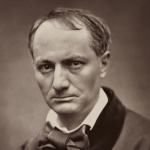The birds against the April wind
Flew northward, singing as they flew;
They sang, “The land we leave behind
Has swords for corn-blades, blood for dew.”
“O wild-birds, flying from the South,
What saw and heard ye, gazing down?”
“We saw the mortar’s upturned mouth,
The sickened camp, the blazing town!
“Beneath the bivouac’s starry lamps,
We saw your march-worn children die;
In shrouds of moss, in cypress swamps,
We saw your dead uncoffined lie.
“We heard the starving prisoner’s sighs
And saw, from line and trench, your sons
Follow our flight with home-sick eyes
Beyond the battery’s smoking guns.”
“And heard and saw ye only wrong
And pain,” I cried, “O wing-worn flocks?”
“We heard,” they sang, “the freedman’s song,
The crash of Slavery’s broken locks!
“We saw from new, uprising States
The treason-nursing mischief spurned,
As, crowding Freedom’s ample gates,
The long-estranged and lost returned.
“O’er dusky faces, seamed and old,
And hands horn-hard with unpaid toil,
With hope in every rustling fold,
We saw your star-dropt flag uncoil.
“And struggling up through sounds accursed,
A grateful murmur clomb the air;
A whisper scarcely heard at first,
It filled the listening heavens with prayer.
“And sweet and far, as from a star,
Replied a voice which shall not cease,
Till, drowning all the noise of war,
It sings the blessed song of peace!”
So to me, in a doubtful day
Of chill and slowly greening spring,
Low stooping from the cloudy gray,
The wild-birds sang or seemed to sing.
They vanished in the misty air,
The song went with them in their flight;
But lo! they left the sunset fair,
And in the evening there was light.





















Comment form: